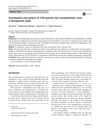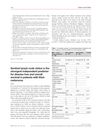 7 citations,
July 2011 in “Survey of Ophthalmology”
7 citations,
July 2011 in “Survey of Ophthalmology” The document concludes that periocular hair disorders have various causes and treatments, and proper evaluation by specialists is important for management and prognosis.
 6 citations,
March 1999 in “Journal of pediatric health care”
6 citations,
March 1999 in “Journal of pediatric health care” The document emphasizes the need for primary care providers to understand and care for African American children's hair and skin to boost their self-esteem.
 5 citations,
December 2005 in “Clinical Techniques in Equine Practice”
5 citations,
December 2005 in “Clinical Techniques in Equine Practice” Skin and hair changes in horses can indicate serious diseases, and recognizing these signs is important for treatment and management.
 4 citations,
October 2022 in “Frontiers in public health”
4 citations,
October 2022 in “Frontiers in public health” Cadmium chloride pollution can cause skin disorders, speed up aging, and prevent hair growth.
 4 citations,
October 2012 in “Expert Review of Dermatology”
4 citations,
October 2012 in “Expert Review of Dermatology” Dermoscopy greatly improves melanoma diagnosis and reduces unneeded surgeries.
 3 citations,
January 2012 in “Elsevier eBooks”
3 citations,
January 2012 in “Elsevier eBooks” Burn scars form abnormally due to changes in wound healing, and more research is needed to improve treatments.
 2 citations,
January 2014 in “Springer eBooks”
2 citations,
January 2014 in “Springer eBooks” The book details skin conditions in older adults, their link to mental health, cancer treatment importance, hair loss remedies, and managing autoimmune and itchy skin.
 2 citations,
July 2013 in “Veterinary dermatology”
2 citations,
July 2013 in “Veterinary dermatology” Dog skin with hair loss, when transplanted to mice, regrew hair, suggesting the hair loss cause is likely body-wide, not skin-specific.
 1 citations,
October 2018 in “European Journal of Plastic Surgery”
1 citations,
October 2018 in “European Journal of Plastic Surgery” The study found that hair transplant complications are rare, with swelling being the most common issue.
 1 citations,
January 2013 in “Elsevier eBooks”
1 citations,
January 2013 in “Elsevier eBooks” The document reviews various hair and nail disorders, their causes, and treatments, emphasizing the need for proper diagnosis and the link between nail changes and systemic diseases.
 1 citations,
December 2012 in “Journal of the European Academy of Dermatology and Venereology”
1 citations,
December 2012 in “Journal of the European Academy of Dermatology and Venereology” The health of the sentinel lymph node is the best indicator of survival for patients with thick skin cancer.
 1 citations,
November 2011 in “Dermatologica Sinica”
1 citations,
November 2011 in “Dermatologica Sinica” Women using hair relaxers with alopecia had lower zinc levels, suggesting zinc deficiency might contribute to hair loss.
 1 citations,
April 2010 in “Expert Review of Dermatology”
1 citations,
April 2010 in “Expert Review of Dermatology” The document concludes that early diagnosis and treatment are crucial for managing rare hair loss disorders and that more research is needed to improve treatment strategies.
 1 citations,
March 2004 in “Journal of The European Academy of Dermatology and Venereology”
1 citations,
March 2004 in “Journal of The European Academy of Dermatology and Venereology” Hair loss improved with treatment and successful transplant.
 January 2024 in “Journal of Natural Remedies”
January 2024 in “Journal of Natural Remedies” Solanum nigrum extract may help regrow hair.
 March 2019 in “Applied sciences”
March 2019 in “Applied sciences” Laser therapy might help regrow hair in alopecia totalis better than steroids alone.
 January 2019 in “Medicine Science | International Medical Journal”
January 2019 in “Medicine Science | International Medical Journal” Children with different rheumatologic diseases have specific skin symptoms that can help with diagnosis.
 July 2018 in “Elsevier eBooks”
July 2018 in “Elsevier eBooks” Acne keloidalis nuchae is a chronic skin condition more common in African men, causing itchy or painful bumps and can lead to permanent hair loss if not treated early.
 July 2018 in “Elsevier eBooks”
July 2018 in “Elsevier eBooks” Discoid Lupus Erythematosus often causes scarring hair loss, is influenced by genetics and environment, and requires early treatment to prevent worsening.
 January 2017 in “Springer eBooks”
January 2017 in “Springer eBooks” The document explains various skin conditions and their treatments.
 January 2017 in “Archives of clinical and biomedical research”
January 2017 in “Archives of clinical and biomedical research” Enhancing melanin's energy generation may help treat alopecia areata.

The document explains different types of skin lesions and their characteristics, causes, and related conditions.

Some medications can cause hair loss, and it's important to track when the hair loss starts after taking a new medication.
 September 2004 in “Experimental dermatology”
September 2004 in “Experimental dermatology” Melatonin directly affects mouse hair follicles and may influence hair growth.
 January 1998 in “Lasers in Surgery and Medicine”
January 1998 in “Lasers in Surgery and Medicine” Lasers are effective and safe for various medical treatments, including cancer, wound healing, and skin conditions.
 4 citations,
August 2021 in “Frontiers in Cell and Developmental Biology”
4 citations,
August 2021 in “Frontiers in Cell and Developmental Biology” Stress can cause hair loss by affecting nerve-related hair growth, and noradrenaline might help prevent this.
April 2018 in “Veterinary Pathology” Tigers had a skin condition causing hair loss and inflammation, but the cause is unknown and treatment didn't work.
55 citations,
October 2019 in “The journal of allergy and clinical immunology/Journal of allergy and clinical immunology/The journal of allergy and clinical immunology” The review suggests that other immune cells besides CD8+ T cells may contribute to alopecia areata and that targeting regulatory cell defects could improve treatment.
 August 2024 in “Frontiers in Nutrition”
August 2024 in “Frontiers in Nutrition” Antioxidant-rich diets may reduce hair loss risk, while pro-inflammatory diets may increase it, especially in women.
 July 2023 in “International journal of trichology”
July 2023 in “International journal of trichology” Injectable platelet-rich fibrin may stop hair loss from Discoid lupus erythematosus.




























